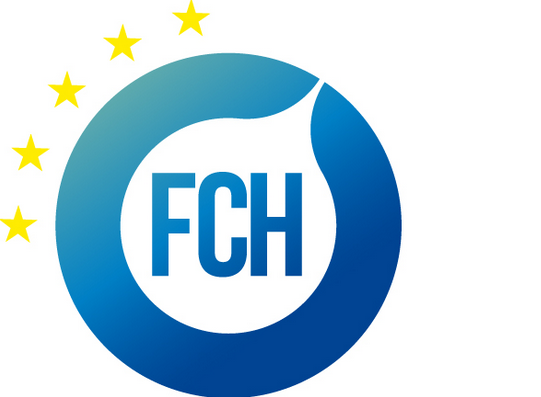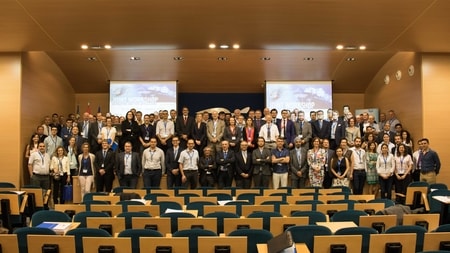 June 28, 2017 —The Valenciaport Foundation and the Port Authority of Valencia inaugurated this morning the workshop “Workshop on Maritime and port applications”, organized by FCH JU (Fuel Cells and Hydrogen Joint Undertaking, a public-private partnership supported by the European Commission that seeks to promote the use of hydrogen as alternative fuels, and JRC (Joint Research Center) .The first prototypes of hydrogen-powered port machinery are expected to be available by the end of this decade.
June 28, 2017 —The Valenciaport Foundation and the Port Authority of Valencia inaugurated this morning the workshop “Workshop on Maritime and port applications”, organized by FCH JU (Fuel Cells and Hydrogen Joint Undertaking, a public-private partnership supported by the European Commission that seeks to promote the use of hydrogen as alternative fuels, and JRC (Joint Research Center) .The first prototypes of hydrogen-powered port machinery are expected to be available by the end of this decade.
The day was inaugurated by the Director of Strategy and Innovation of the PAV, Ramón Gómez-Ferrer; the Deputy Director of Industrial Sectoral Policies in the Ministry of Economy, Industry and Competitiveness, Alejandro Cros Bernabéu; the Policy Officer of the European Commission’s Directorate-General for Research and Innovation, Katarzyna Drabicka; and the Head of Unit of Operation and Communication of FCH JU, Mirela Atanasiu.
During the meeting, Ramón Gómez-Ferrer stressed that “from the Port Authority of Valencia we try to promote the adoption of best practices to reduce emissions in our port environment. The emission reduction targets set out in the Paris Declaration are ambitious and we are therefore exploring all the alternatives to contribute to mitigating climate change”. In this sense, PAV´s Strategy Director has pointed out that “The hydrogen fuel cells are a very interesting alternative because they don´t generate emissions neither noise, but it is necessary to investigate and make further progress in this technology,” and he has also reminded that “the PAV and the Valenciaport Foundation have been participating for many years in different projects and initiatives that allow us to explore the use of new energy sources in the maritime port area, in fact, tests have already been carried out for the use of LNG in port machinery. ”
 In this sense, the PAV and Valenciaport Foundation signed, last November, a collaboration agreement with FCH JU with the objective of promoting the use of hydrogen and fuel cells in the Port of Valencia, becoming part of the more than 70 regions and cities of 20 European Union countries that have signed this memorandum, including the cities of London, Reykjavik, Venice or Hamburg, and the regions of Paises del Loira or Rhine-Westphalia, between Others.
In this sense, the PAV and Valenciaport Foundation signed, last November, a collaboration agreement with FCH JU with the objective of promoting the use of hydrogen and fuel cells in the Port of Valencia, becoming part of the more than 70 regions and cities of 20 European Union countries that have signed this memorandum, including the cities of London, Reykjavik, Venice or Hamburg, and the regions of Paises del Loira or Rhine-Westphalia, between Others.
Ramón Gómez-Ferrer concluded by noting that “with this type of initiatives the PAV and the Valenciaport Foundation reaffirm their firm commitment to protecting the environment and climate change.”
For his part, Carlos Navas, head of FCH JU, stressed that “hydrogen cells produce electricity and have great advantages for reducing emissions and for use in transport. So far, we are working in the field of land transport but we want to explore the possibilities of maritime transport. Therefore, we are very grateful for the interest shown by the Port Authority of Valencia and the Valenciaport Foundation because we want to explore this market. Our intention is to start developing prototypes to use in the maritime-port environment to check technical needs and economic cost. We estimate that by the end of this decade we may be testing prototypes of hydrogen-powered port machinery”.
“Workshop on Maritime and port applications”
The conferences held in Valencia give continuity to the one held in 2015 on “smart specialization” in Lyon and further examine maritime and port applications, with several sessions focused on hydrogen applications and fuel cells for ships , logistics and stationary applications, as well as other aspects including security, regulations and funding mechanisms.
During the first session a review of the perspectives and opportunities for the application of hydrogen in the maritime sector has been made, in which it has come to the conclusion that the sector is prepared to face this new challenge with guarantees of success.
The following session has been focused on the available solutions for the application of hydrogen and fuel cells in ships, in order to achieve zero emissions. Representatives from Ballard, ABB Marine & Ports, Fincantieri Spa, Project MARANDA, and Proton Motor Fuel Cell GmbH have participated.
The third session has been focused on the applications of this fuel in vehicles and heavy machinery for the handling of goods. Representatives from MSC Terminals, Nuvera Fuel Cells, HyPulsion-PlugPower and PowerCell have unveiled their vision on the feasibility of using these vehicles, demonstrating that new developments can be launched in the short-medium term.
During the fourth session, the challenges that have to be faced for a complete implementation of hydrogen as a fuel have been raised, taking into account the environmental advantages and the safety requirements. Representatives of the main European security organizations and classification societies of recognized prestige have exposed the available normative.
It is expected that on Friday will address hydrogen supply models in ports as well as applications to generate clean energy contributing to meet the goals set in the Paris Climate Change Agreement. It will also address the creation of interregional cooperation mechanisms that will increase investment in innovation within European borders, promoting the creation of platforms and the combination of instruments for this purpose.